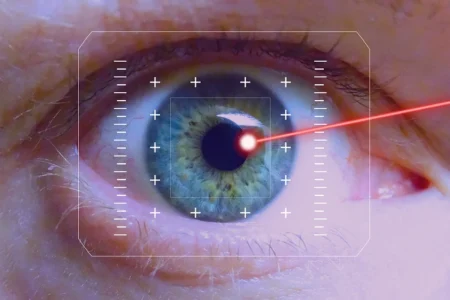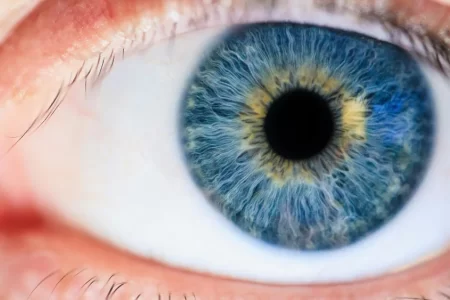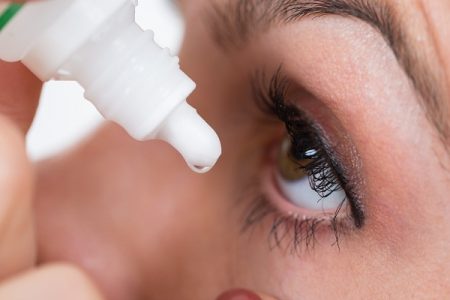Causes of Dry Eye Syndrome
- Updated on: Jun 27, 2024
- 3 min Read
- Published on Apr 19, 2021


When you’re happy, your eyes are still full of tears. These tears provide lubrication to maintain health of your eyes and keep you comfortable.
When you have dry eyes, you feel uncomfortable. You may have difficulty in performing certain activities if you have dry eye syndrome.
Tears
Do you know what are your tears made of? Your tears constitute three components:
- Water: water is used to provide moisture to eyes
- Oils: oils provide necessary lubrication
- Mucus: a mucus layer helps in spreading the tears evenly on the surface
- Certain antibodies: these keep your eyes safe from infections
These components of your tears come are produced by special glands present in and around your eyelids.
What causes dry eyes?
Dry eye can develop if your eyes don’t produce enough good quality tears or your tears evaporate too quickly.
This can happen if your tear production process becomes disturbed and either quantity or quality of your tears or both is affected.
In such cases, your tears aren’t able to provide enough lubrication. This causes the eyes to dry out and become red and swollen causing irritation and itching and other signs of dry eye syndrome. Read about signs and symptoms of dry eyes.
Inadequate amount of tears
There are several glands in and around our eyelids that produce tears. As we grow old, tear production decreases. The process of tears production also decreases with various medical conditions or as a side effect of certain medicines. Environmental conditions, such as wind and dry climates, can also cause the tears to evaporate fast. When the tear production decreases or the tears evaporate too fast from your eyes, you may develop dry eye symptoms.
Poor quality of tears
The various components of tears protect your eye and nourish them to maintain eye health. The oil layer helps in preventing evaporation of the water layer. The mucus layer helps in even spreading of the tears over the surface of the eye. If your tears evaporate too quickly or do not spread evenly over the surface due to problems with any of the three layers, you can have dry eyes.
There are many different reasons why this can happen, although a single cause may not be found.
Some of the possible causes are described herein.
Ageing
When you are old you are more likely to develop dry eye symptoms. This is perhaps because your tear production system is not as effective as it is when you are young. You produce fewer tears as you get older, and your mucus layer become less effective at spreading the tears over the surface of the eyes.
Hormonal changes
Hormones are responsible for stimulation of tear production processes. When there are changes in hormones, dry eye symptoms can occur. For example, changes in hormone levels in women in the following conditions can cause dry eye symptoms to develop.
- Pregnancy
- Menopause
- Use of contraceptive medication
Environment
Environmental facts play a role in the development of dry eye signs. Certain conditions can cause the tears to evaporate quickly. These are:
- Dry climate
- Being in the sun
- Hot blowing air
- When in mountains or at high altitude
- Wind
Certain activities
Certain activities can also contribute to dry eye syndrome, such as these:
- Use of computer screens or mobile phones
- Reading for extended periods
- Writing for an extended time period
- Watching TV or playing video games
Medications
Certain medications can cause dry eyes as a side effect in some people.
- Beta blockers
- Antihistamines
- Antidepressants
- Diuretics
Medical conditions
Certain medical conditions can put you at a higher risk of getting dry eyes. These are:
- Allergic conjunctivitis
- Rheumatoid arthritis
- Contact dermatitis
- Sjögren’s syndrome
- Scleroderma
- Lupus
- Any trauma or serious injury to eyes
- HIV
- Bell’s palsy
- Diabetes
- Vitamin A deficiency
- Inflammation along the edge of your eyelids (called blepharitis)
- Rosacea and some other skin disorders can cause your meibomian glands to become blocked, making dry eyes more likely.
Eye surgery
Some people who go through refractive surgeries such as a laser-assisted in-situ keratomileusis (LASIK) surgery are at an increased risk of developing dry eye syndrome.
This is generally temporary though and the symptoms fade away after a few months from the surgery.
Use of contact lenses
Contact lenses can also increase the risk of dry eyes.
If you experience irritation in eyes due to dryness, you can try a few things help relieve the symptoms.
- Change to a different type of lens
- Limit your usage of the contact lens
- Use alternative cleaning solutions
- Use lubricants available in the form of eye drops












